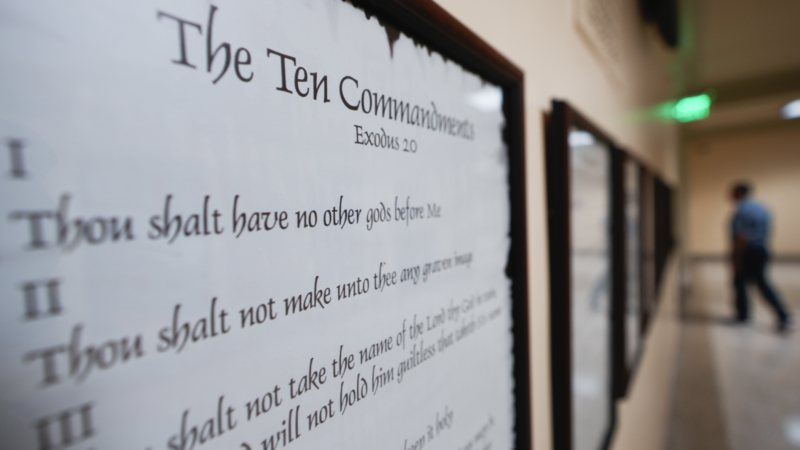Federal judge blocks Louisiana law that requires classrooms to display Ten Commandments
BATON ROUGE, LA. — A new Louisiana requirement that the Ten Commandments be displayed in every public classroom by Jan. 1 was temporarily blocked Tuesday by a federal judge who said the law is “unconstitutional on its face.”
U.S. District Judge John W. deGravelles in Baton Rouge said the law had an “overtly religious” purpose, and rejected state officials’ claims that the government can mandate the posting of the Ten Commandments because they hold historical significance to the foundation of U.S. law. His opinion noted that no other foundational documents — including the Constitution or the Bill of Rights — must be posted.
In granting a preliminary injunction, DeGravelles said opponents of the law are likely to win their ongoing lawsuit against the law. The lawsuit argues that the law violates the First Amendment’s provisions forbidding the government from establishing a religion or blocking the free exercise of religion. They had argued that the poster-sized display of the Ten Commandments would isolate students, especially those who are not Christian.
DeGravelles said the law amounts to unconstitutional religious government coercion of students: “As Plaintiffs highlight, by law, parents must send their minor children to school and ensure attendance during regular school hours at least 177 days per year.”
Proponents say that the measure is not solely religious, but that it has historical significance to the foundation of U.S. law.
Plaintiffs in the case were a group of parents of Louisiana public school children.
The new law in Louisiana, a reliably Republican state that is ensconced in the Bible Belt, was passed by the state’s GOP-dominated Legislature earlier this year. The Associated Press sought comment Tuesday morning from Gov. Jeff Landry and Attorney General Elizabeth Murrill, both Republicans and supporters of the law.
The legislation, which has been touted by Republicans including President-elect Donald Trump, is one of the latest pushes by conservatives to incorporate religion into classrooms — from Florida legislation allowing school districts to have volunteer chaplains to counsel students to Oklahoma’s top education official ordering public schools to incorporate the Bible into lessons.
In recent years, similar bills requiring the Ten Commandments to be displayed in classrooms have been proposed in other states including Texas, Oklahoma and Utah. However, with threats of legal battles over the constitutionality of such measures, none have gone into effect.
In 1980, the U.S. Supreme Court ruled that a similar Kentucky law was unconstitutional and violated the First Amendment establishment, which says Congress can “make no law respecting an establishment of religion.” The high court found that the law had no secular purpose but rather served a plainly religious purpose.
Louisiana’s legislation, which applies to all public K-12 schools and state-funded university classrooms, requires the Ten Commandments to be displayed on a poster or framed document at least 11 inches by 14 inches (28 by 36 centimeters) where the text is the central focus and “printed in a large, easily readable font.”
Each poster must be paired with the four-paragraph “context statement” describing how the Ten Commandments “were a prominent part of American public education for almost three centuries.”
Tens of thousands of posters would likely be needed to satisfy the new law. Proponents say schools are not required to spend public money on the posters, and instead that they can be bought using donations or that groups and organizations will donate the actual posters.
Party City files for bankruptcy and plans to shutter nationwide
Party City was once unmatched in its vast selection of affordable celebration goods. But over the years, competition stacked up at Walmart, Target, Spirit Halloween, and especially Amazon.
Sudan’s biggest refugee camp was already struck with famine. Now it’s being shelled
The siege, blamed on the Rapid Support Forces, has sparked a new humanitarian catastrophe and marks an alarming turning point in the Darfur region, already overrun by violence.
FDA approves weight loss drug Zepbound to treat obstructive sleep apnea
The FDA said studies have shown that by aiding weight loss, Zepbound improves sleep apnea symptoms in some patients.
Netflix is dreaming of a glitch-free Christmas with 2 major NFL games set
It comes weeks after Netflix's attempt to broadcast live boxing between Jake Paul and Mike Tyson was rife with technical glitches.
Opinion: The Pope wants priests to lighten up
A reflection on the comedy stylings of Pope Francis, who is telling priests to lighten up and not be so dour.
The FDA restricts a psychoactive mushroom used in some edibles
The Food and Drug Administration has told food manufacturers the psychoactive mushroom Amanita muscaria isn't authorized for food, including edibles, because it doesn't meet safety standards.







